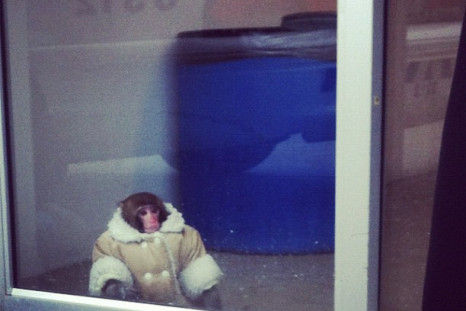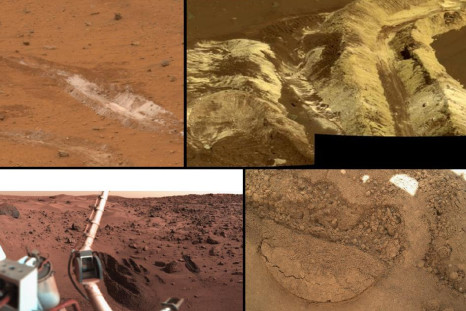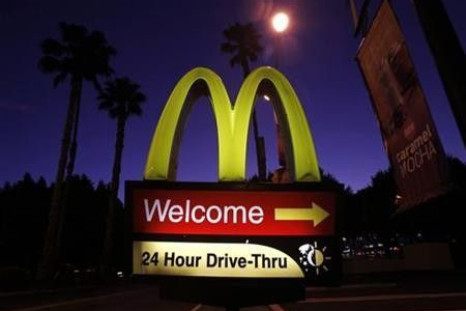Asteroid Toutatis Passes Close By, But It's Not Riskiest Threat To Earth
NASA keeps tabs on Toutatis and other celestial objects that make close fly-bys of Earth, but the odds of any object devastating the planet within the next few centuries are very small.
Battlefield Injury Treatment Could Migrate To Civilian Use: Experimental Foam Treats Internal Bleeding
New foam technology is designed to stabilize wounded soldiers by compressing internal injuries that can't be seen.
Ikea Monkey Taken From Its Owner: A Look At Primate Pet Laws, State By State
Most experts will tell you that monkeys are not the best choice for a pet, but if you're dead set on getting a primate companion, know if your state has laws against keeping one.
Fat Transplants For Weight Loss? It Works In Mice
Brown fat transplants helped mice slim down and tolerate glucose better, suggesting the procedure could one day be used to treat obesity and diabetes in humans.
Lack Of Oxygen In Womb Raises ADHD Risk: Study
Babies who were deprived of oxygen during pregnancy or just around birth were more likely to develop attention deficit hyperactivity disorder later in life, a new study shows.
Promising Bedbug Treatment No Match For Stubborn Critters
Ultrasonic devices are not effective in either attracting or repelling bedbugs, according to a new study.
Patrick Moore Dead At 89: Cat-Loving Astronomer Led Extraordinary Life
Moore, the enthusiastic and eccentric science communicator that hosted the BBC's "The Sky At Night," died at home Sunday.
Kate Middleton's Royal Morning Sickness Highlights Rare Condition, Raises Odds For Princess Birth
Kate Middleton's bout with a rare form of severe morning sickness suggests there may be a royal daughter, or royal twins, in the future.
New Study Supports Fasting Treatment For Seizures In Kids
New research claims that occasional fasting can help reduce seizures in children with epilepsy.
Scientists Find New Bacteria That Feasts On Antibiotics
Long-term exposure to antibiotics, like the kind seen with agricultural runoff, may encourage antibiotic-digesting bacteria to thrive.
More Evidence For Immune System Role In Autism
New research points to a close association between autism and an altered immune system response to viral infections.
Memories Of A Big Meal Can Help Satisfy Hunger, Even When Eating Less
People that thought they had eaten a much larger meal than they actually had reported feeling just as satisfied as those that chowed down on a full serving.
Invasive Grass Fuels Wildfires In Western US
Invasive cheatgrass is contributing to bigger and more frequent wildfires in the western U.S., according to new research.
What Has The Curiosity Rover Taught Us About Mars So Far?
No history-making revelations yet from the little rover on Mars, but the two-year mission is just getting started.
To A Dog, Size Matters In Understanding Words
If a dog manages to learn that the thing he should not chew on is called "shoe," he may be able to apply that knowledge to a shoe-sized chew toy, but not, say, a pair of boots.
The Science Of How And Why Left-Handers Are So Uncommon
In a world full of woefully inadequate corkscrews and scissors, frustrated southpaws of the world may wonder: How did right-handedness become the norm?
Some Teens Might Be Wired For Heavy Drinking
Some teens may find alcohol especially enticing because their brains are wired to get a bigger kick out of getting drunk.
Scientists Find Stricter Rules Help Curb Hockey Injuries To Youth
Mandatory rules against aggressive play, including things like the banning of bodychecking, resulted in an average decrease of between one and six penalties per game and injury rates decreased by anywhere from three- to 12-fold, a new study found.
World AIDS Day: No Vaccine Yet, But Recent Antibody Discoveries Spark Hope
Designing an HIV vaccine is difficult, due to the wily nature of the virus. But certain antibodies could help prevent AIDS effectively.
Ice On Mercury: What Next?
Scientists have collected hard evidence that the tiny world closest to our Sun has at least one polar ice cap.
Food Ads More Enticing To Obese Children: Study
In a brain-scan study, obese children's brains lit up in reward areas much more than healthy children's when seeing food-related logos.
Bigger, More Powerful Black Holes Discovered
One group of scientists found a black hole 17 billion times as massive as our sun, while another group discovered a black hole blasting out energy at a rate 100 times higher than the output of the Milky Way galaxy.
Many Women Choosing Unneeded Double Mastectomies: Study
Some women opt to remove both breasts after a bout with breast cancer, but for many patients, this is unnecessary, a researcher says.
Unfaithful Wives Mean Doting Uncles, Scientist Says
In societies where extramarital relations are common, female infidelity often translates into benefits for a man's nieces and nephews.
Hairspray Ingredient Could Lead Us To Aliens
Chlorofluorocarbons, or CFCs, are banned on Earth thanks to their ozone-depleting nature, but if we find traces of them in space we could be led to alien civilizations.
Celiac-Proof Bread? Genetically Altered Wheat Could Be Safe For The Gluten Intolerant
Scientists are working on creating strains of wheat with lower levels of gluten that won't provoke symptoms in celiac patients.
Man Vs. Machine: Cambridge University To Launch Center For The Study Of Existential Risk
A new Cambridge University research center will focus on investigating potential threats to humanity, ranging from global warming to hostile robots.
Grapefruit-Drug Interactions Can Be Deadly
Many new drugs should not be taken with grapefruit.
Buyer Beware: Why You Shouldn't Follow Your Nose This Holiday Shopping Season
Holiday decorations in a store might smell like pine or cloves to you, but for shop owners they have the distinct aroma of cash.
Your Thanksgiving Turkey Backstory: Snoods, Mayans, Dark Meat and Ben Franklin
Though the turkey might not be the national bird for most of the year, millions of Americans will vote with their knives and forks on Thanksgiving.




















